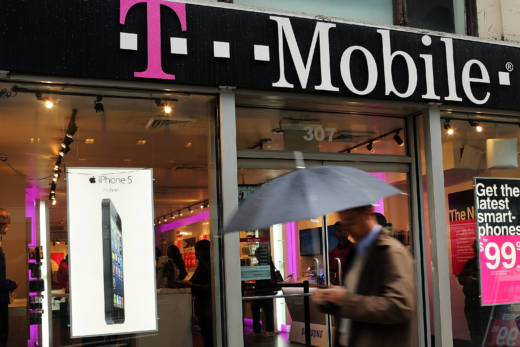California Takes Lead in 9-State Lawsuit to Block $26.5 Billion Sprint-T-Mobile Merger

A group of state attorneys general led by California and New York filed a federal lawsuit Tuesday to block T-Mobile’s $26.5 billion bid for Sprint, citing consumer harm.
The state attorneys general said the promised benefits, such as better networks in rural areas and faster service overall, cannot be verified, while eliminating a major wireless company will immediately harm consumers by reducing competition and driving up prices for cellphone service.
“T-Mobile and Sprint already provide service, here in California, to more than 13 million people, and if they merge, the new company would have more than 50 percent of the market share in some parts of our great state,” California Attorney General Xavier Becerra said at a news conference on Tuesday.
Combining the two companies would reduce access to affordable, reliable wireless service, particularly among California’s lower-income and minority communities, and could cost subscribers at least $4.5 billion a year, he added.
“As the dominant network providers for prepaid mobile services — that’s services that are available without credit checks — they provide services to large percentages of lower-income populations,” Becerra said. “For many people, these prepaid phones may be the only way they get access to online services, may be the only way they can connect with family or to pursue business or educational opportunities.”
Other attorneys general joining Tuesday’s lawsuit are from Colorado, Connecticut, the District of Columbia, Maryland, Michigan, Mississippi, Virginia and Wisconsin. All 10 attorneys general are Democrats. The lawsuit was filed in U.S. District Court in New York.
The lawsuit is an unusual step by state officials ahead of a decision by federal antitrust authorities. The Justice Department’s decision is pending. The Republican majority of the Federal Communications Commission supports the deal, though the agency has yet to vote.
Too many “mega mergers have sailed through the governmental approval process,” so it’s up to the states to “step up,” said New York Attorney General Letitia James at a news conference.
“There’s no rule or regulation that we have to wait for the DOJ,” she said, adding that attorneys general will “continue to litigate whether the DOJ approves the merger or not.”
Diana Moss, the president of the American Antitrust Institute, said the states’ lawsuit could signal to other potential merger partners that there would be tougher enforcement from states, even if the federal government permitted deals to go through.
James said Tuesday that her office’s renewed focus on mergers and anti-competitiveness goes beyond the tech industry, though she did not elaborate.
T-Mobile and Sprint have argued that they need to bulk up to upgrade to a fast, powerful 5G mobile network that competes with Verizon and AT&T. The companies are appealing to President Trump’s desire for the U.S. to “win” a global 5G race.
Consumer advocates, labor unions and many Democratic lawmakers worry that the deal could mean job cuts, higher wireless prices and a hit to the rural cellphone market.
Amanda Wait, an antitrust lawyer who formerly worked for the Federal Trade Commission, said states are taking action because they disagree with what they have seen the federal government doing.
“They see the FCC accepting certain remedies and concessions that don’t, in their minds, solve the problem,” she said.
T-Mobile declined to comment. Sprint and the Justice Department did not immediately respond to requests for comment.
One famous example of when the states and the federal government diverged on a big antitrust case was in the fight against Microsoft, although that was not a merger case. Several states dissented from the Justice Department’s settlement roughly 20 years ago, pushing for tougher sanctions to curtail Microsoft’s ability to use its dominance in the Windows operating system to thwart competition in other technologies.
More recently, five states, including California, criticized the federal government’s approval of last year’s Bayer-Monsanto agribusiness merger.
T-Mobile and Sprint previously tried to combine during the Obama administration but regulators rebuffed them. They resumed talks on combining after Trump took office, hoping for more industry-friendly regulators.
T-Mobile has a reputation for consumer-friendly changes to the cellphone industry. T-Mobile and Sprint, for instance, led the return of unlimited-data cellphone plans.
T-Mobile, trying to reassure critics, promised the FCC it would build out a 5G network and invest in rural broadband on a specific timeframe or pay penalties. It also promised to sell off Sprint’s prepaid Boost Mobile brand and keep price increases on hold for three years.
That was enough for FCC Chairman Ajit Pai, a Trump appointee, to back the deal. The other two Republican commissioners indicated they would join him.
But public interest advocates said these conditions did not address concerns about higher prices and reduced competition — and would be difficult for regulators to enforce.
The Justice Department evaluates deals using stricter criteria than the FCC’s “public interest” standard — namely whether they harm competition and raise prices for consumers. Staff attorneys at DOJ have reportedly told the companies they won’t approve the deal as proposed, but the ultimate decision lies with Makan Delrahim, also a Trump appointee, who is the top antitrust official in the Justice Department.
The state attorneys general said in Tuesday’s lawsuit that combining Sprint and T-Mobile would make the industry as a whole — including Verizon and AT&T — less likely to offer plans and services favorable to consumers. And they say the companies have already been working to roll out 5G and don’t need to combine to do so.
Japanese tech conglomerate SoftBank owns Sprint, while Germany’s Deutsche Telekom owns T-Mobile.
KQED’s Jeremy Siegel contributed to this report.
